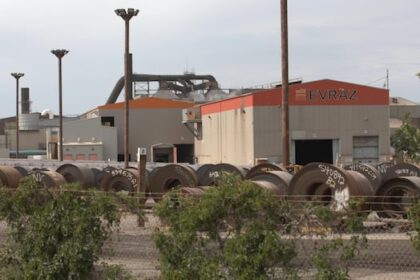Ottawa·NewWith the temperature dropping in recent days, concerned residents are looking for the city to act on its winter homelessness plan.Concerned citizens rally outside city hall to raise awareness and pressureAnchal Sharma · CBC News · Posted: Nov 20, 2025 5:17 PM EST | Last Updated: 10 minutes agoListen to this articleEstimated 4 minutesThe audio version of this article is generated by text-to-speech, a technology based on artificial intelligence.A participant holds up a sign at a rally on Wednesday asking the City of Ottawa to step up its efforts to help homeless people living out in the cold. (Submitted by Marina Gomá)As temperatures drop, concerned residents are looking to the city to do more to help people who are living out in the cold. At a Wednesday night rally outside city hall, dozens repeated a single demand — for the city to open easily accessible, fully staffed, 24-hour warming centres, or overnight shelters, immediately, through to the end of March.”It’s already really cold and we’re only in November. I have to imagine that it’s not going to get any easier,” said Alex Minelli, a resident at the rally. The city previously operated 12 emergency overflow shelters, spread out across Ottawa, serving over 5,500 individuals over five years. The last of those shelters closed in August. Gerald Jorgensen, who lived at one of those shelters in 2022, says he received food every day, and “a little bit of dignity.”When the shelter closed, Jorgensen says he was back on the streets and living in encampments, where he experienced a drug overdose. At the shelter, he says there was trained staff to help in those situations. “There’s people going to probably die as a result of these [overflow shelters] not being open,” Jorgensen said. Gerald Jorgensen lived at a city-run emergency overflow shelter in 2022, but then it closed. (Emma Weller/CBC)City to focus on transitional housingCBC reached out to the city in the leadup to the rally to ask about its winter emergency plan. The city directed CBC to the Integrated Transition to Housing Strategy (ITHS) report presented to city council earlier this month.As that report outlines, the city is shifting its focus to new transitional housing facilities, which will accommodate asylum seekers. It also notes 700 permanent beds have been added to the system over the last two years and outlines a 2025/2026 winter plan for single adult shelter services. That plan includes potential space at the St. Joseph Transitional Housing site for asylum seekers with the capacity to serve 40 clients, and a former federal government building at 250 Lanark Ave. which can serve 60 clients. The Lanark site will be opened if demand exceeds capacity at the city’s existing facilities. Protesters gather outside city hall on Wednesday night. (Submitted by Marina Gomá)The plan also includes “24/7 low barrier overnight warming and respite services” through Centre 507, a drop-in centre run by the city, and outreach workers to distribute winter supplies like sleeping bags, clothing and handwarmers. Following the rally, the city issued a memo to city councillors outlining those same measures. Advocates like Marina Gomá told CBC those strategies aren’t enough to address the immediate needs of people who are unsheltered this winter. She pointed out that the St. Joseph site is still undergoing renovations and does not have a completion date, and that demand for shelter is already high. “They’re saying there’s a warm bed for everybody, [that] if someone wants shelter they can find it, they can refer themselves. These are myths,” said Gomá, who worked at a city drop-in centre last winter. “The frontline workers that are making the calls to 311, they are struggling to get people referred,” she added. According to the ITHS report, demand among single adults for shelter or transitional housing placements has grown 62 per cent since 2023. Overall system capacity has increased by 84 per cent, including growth in transitional housing by 291 per cent (from June 2023), the report adds. Gomá said she wants the city to reopen its overflow shelter at 250 Lanark immediately, instead of waiting for demand to grow. “They have kept their lease, but they haven’t opened it yet,” she said. “What we’re saying is we need multiple centres with multiple locations that are accessible.”ABOUT THE AUTHORAnchal Sharma is a CBC journalist based in Ottawa. Send her an email at anchal.sharma@cbc.caWith files from Emma Weller
Thursday, 5 Mar 2026
Canada – The Illusion
Search
Have an existing account?
Sign In
© 2022 Foxiz News Network. Ruby Design Company. All Rights Reserved.
You May also Like
- More News:
- history
- Standing Bear Network
- John Gonzalez
- ᐊᔭᐦᑊ ayahp — It happened
- Creation
- Beneath the Water
- Olympic gold medal
- Jim Thorpe
- type O blood
- the bringer of life
- Raven
- Wás’agi
- NoiseCat
- 'Sugarcane'
- The rivers still sing
- ᑲᓂᐸᐏᐟ ᒪᐢᑿ
- ᐅᑳᐤ okâw — We remember
- ᐊᓂᓈᐯᐃᐧᐣ aninâpêwin — Truth
- This is what it means to be human.
- Nokoma











